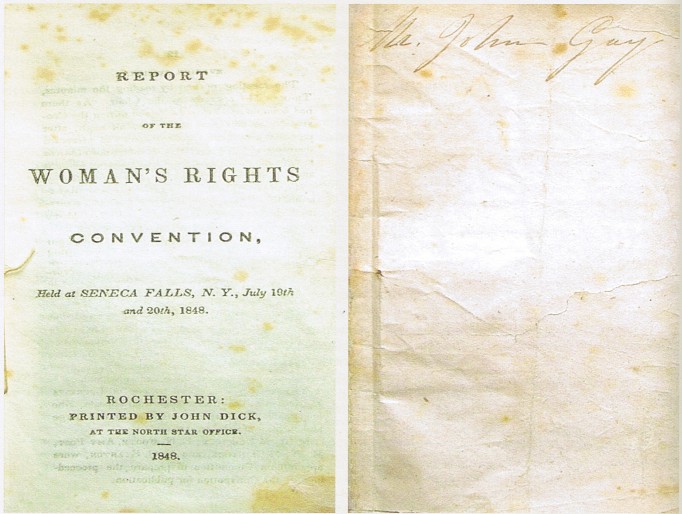Fascinating and Important Manuscripts from Michael Brown Rare Books

Fascinating and Important Manuscripts from Michael Brown Rare Books
Item 82 is an exception to this catalogue as it is a printed document, but with a hand-written presentation from a critical participant. It is a copy of the original Report of the Woman's Rights Convention, Held at Seneca Falls, N.Y., July 19th and 20th, 1848. This was the first women's rights convention, in effect, the birthplace of the movement. Brown notes that this is an exceptionally hard to find document. There are seven copies in institutions, but he has found no copies sold at auction in at least 100 years, nor records of any private sales, and he notes that great collectors such as Streeter did not possess first editions such as this. This report contains Elizabeth Cady Stanton's The Declaration of Sentiments, and it is one of only two known copies with a presentation in Stanton's handwriting (this one is clear, while the other presentation is smudged and not as obviously Stanton's writing). The presentation states simply "Mr. John Gay." Gay was a prominent businessman in Seneca Falls. Stanton's Declaration of Sentiments begins, "The history of mankind is a history of repeated injuries and usurpations on the part of man toward woman, having in direct object the establishment of an absolute tyranny over her." The gauntlet was thrown down, and Stanton's dream of women gaining their "unalienable right" to vote was finally achieved in 1920. $500,000.
Item 35 is a lost manuscript account of widespread travels throughout what was the American West of 1808-1810 by one John Maley. Maley called his book, which was never published, An Account of Four Years Travels through the Illinois, Indiana, Louisiana, Missouri and Mississippi Territories with a True and Accurate Account of Every Principal River West of the Mississippi from the Missouri down to the Red River... This was still in the era of Louis and Clark and Zebulon Pike, so an account of such extensive travels is truly an amazing and important find. Maley tells of the natural history, and the white and Indian settlements throughout this wide area. Little is known about Maley, and his life and book might better be described as "unknown" rather than "lost" but for the presence of a second manuscript held by Yale University. That manuscript covering 1810-1812 picks up mid-sentence, implying this earlier account. The second manuscript reached Yale through a gift from Professor Benjamin Silliman, who likely purchased it from New York, later Philadelphia bookseller Isaac Riley. Maley sold his accounts to Riley, undoubtedly expecting they would be published. Silliman was interested in the "Texas Iron," a huge meteorite that had struck Texas and was once a revered item by local Indians. Maley described the Texas Iron in his second journal, perhaps explaining why Silliman purchased only the second one. The existence of this earlier journal, though implied by the second, has otherwise been unknown. There has been some questioning of the accuracy of Maley's claims in the second journal. The problem is that almost nothing is known of him to provide verification. He was born around 1776 in New York, and died in South Carolina in 1819. A judge he befriended in his later years described him as a "wanderer." The journals he wrote were evidently written after his travels, probably around 1815, so they would be based on memory. Certainly this new journal is a great source for scholarship about the early West, and maybe now that his account is complete, we will one day see their publication, even if a couple of centuries late. $575,000.